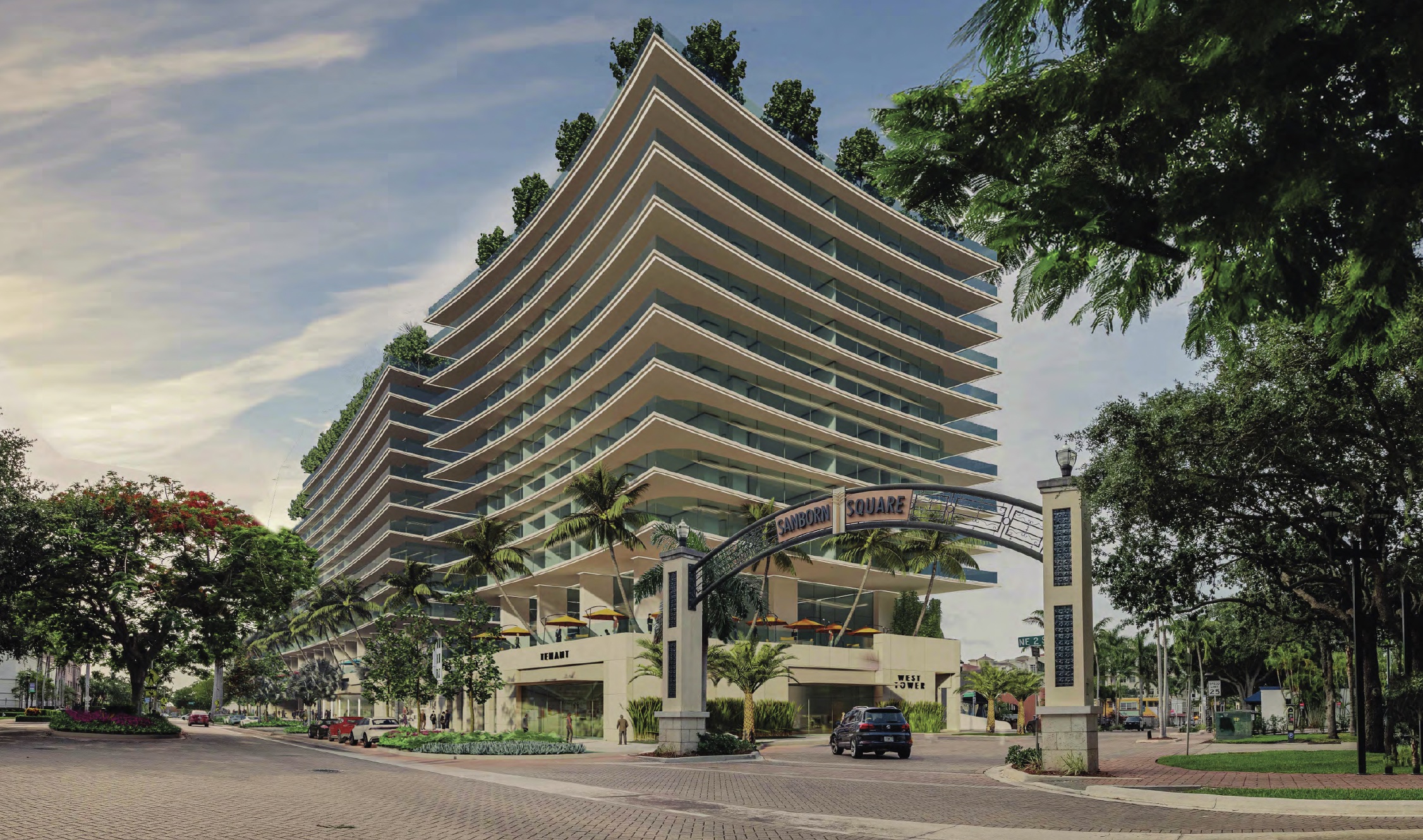Boca Raton is two votes away from losing the city’s downtown post office.
On tonight’s Planning and Zoning Board agenda is Mizner Plaza, the hotel/retail project proposed for three adjoining properties just south of Mizner Park. The one on the west side is home to a strip commercial plaza that features several restaurants. In the middle is the post office. And on the east side is a 0.3-acre parcel that the city owns and which provides added parking for the post office.
James and Marta Batmasian, owners of Investments Limited, want to buy that city parcel and turn the land into a park that they would maintain. Indeed, the project can’t happen if the city doesn’t agree to sell it.
Mizner Plaza’s hotel would have 242 rooms, down from the original proposal, which had 266. There would be roughly 35,000 square feet of retail space. The hotel would be 12 stories tall with an accompanying parking garage.
To meet open space requirements for downtown projects, the Batmasians want to include space on the second floor that would allow public access. As an additional selling point, the project narrative promises to make the area pedestrian- and cyclist-friendly—a place that the public can enjoy. There will be “lush landscaping, captivating water features, striking art sculptures” and other features. The Batmasians’ attorney calls the hotel “a game-changer.”
Seven years ago, Investments Limited threatened to evict the U.S. Postal Service over a lease dispute. Dozens of residents came out to protest the potential loss of what they told city council members was a key business and social nexus. The lease issue was resolved.
As for the land sale, the Batmasians would pay almost $850,000, even though an appraisal placed the value at roughly $2.4 million. According to the staff memo, the Batmasians wanted to pay nothing. Staff arrived at the proposed figure after subtracting nearly $1 million—the cost of constructing 19 public parking spaces to replace those on the site—and $500,000 in maintenance credits.
Residents of Tower 155, on the south side of the site, object, saying that the hotel will block their views and lower their property values. Because the project will meet downtown design guidelines, it can be 140 feet tall. Tower 155, though, got that extra height a decade ago. At the developer’s request the council reduced the minimum lot size to qualify.
The Batmasians want to provide only 372 parking spaces, though the code calls for 569. Their traffic consultant calls that requirement “out of date” for downtown Boca Raton and “unreasonably high.” Until the city revises those rules, “all proposed developments will be significantly overparked in our downtown.” The application maintains that features such as parking for bicycles will reduce the need for cars.
The staff recommends approval of the project and the land sale. If the planning and zoning board agrees, the proposal could go before the council next month.
Delray tries again to save its Pride intersection

Delray Beach will make one last attempt to preserve the city’s LGBTQ Pride intersection.
During Tuesday’s meeting, the city commission voted to argue Delray Beach’s case at an administrative hearing Sept. 2. That is one day before the Florida Department of Transportation (FDOT) has threatened to remove the streetscape “by any appropriate method necessary” and bill the city for the work.
It’s the latest turn in a story that began when the state—citing no evidence—decreed that any artwork on public streets represents a safety threat because it could distract drivers. City Manager Terrence Moore first concluded, after speaking with state officials, that the intersection in Pineapple Grove was exempt because it’s not on a state road.
After further review, though, Moore heard from the regional FDOT office that the ban applies statewide. He scheduled the item for discussion Tuesday and recommended removal, based on the threat in the Aug. 15 letter of the “withholding of state funds” for local governments that fail to comply. Many cities already have.
But that same letter offered the option of that hearing. Commissioner Rob Long, who last week got the commission to hold off until the enforcement notice arrived, urged his colleagues to support the city’s appeal. Supporters of the intersection had packed the chambers.
Long cited federal law to make his point that the dictate is unconstitutional. He noted that the intersection has been in place since 2021; only now is Gov. Ron DeSantis caring.
Long did not blame Moore or City Attorney Lynn Gelin. Their job, he said, is to protect the city from risk. Moore calculated that at least $60 million could be at stake if the city is seen as defying the state.
Mayor Tom Carney, though, does not believe that Delray Beach would jeopardize that money by going through a well-established process. Referring to the audience, he noted that the artwork “means so much to so many.”
Carney acknowledged the obvious: The city has little chance of success. The administrative court is an extension of state government. The letter says the hearing “will not involve a request for an exception or waiver to permit the non-conforming pavement markings to remain in place. The department has already reviewed the pavement markings at the location mentioned above and determined that the pavement markings will not be allowed.”
If the city loses, Moore will present options for a new location to celebrate the sentiment of the intersection—preferably one beyond the reach of current state politics.
Delray to hold special meeting on police contract
The commission will hold a special meeting today on Delray Beach’s stalled police contract.
Commissioners and the Police Benevolent Association were unable last year to agree on a new contract before the previous one expired Sept. 30. In February, the union declared an impasse. Though a special magistrate held a hearing and issued recommendations, there’s been no agreement. Indeed, the two sides exchanged letters blaming the other on the respective responses to the magistrate’s finding.
Wages remain the sticking point. The city argues that it addressed the main priority—starting salaries. The union argues that the offer takes money from older officers. The magistrate agreed with the union.
Commissioners have options today. They could make a new offer. They could hold to their position. They could impose a contract on their terms, though such a contract would be in effect only through this Sept. 30—the end of the budget year.
Delray interim police chief gets permanent position

Speaking of the police department, Moore has named Interim Chief Darrell Hunter to the permanent job.
Hunter took over in June, after the abrupt retirement of Russ Mager. Like Mager, Hunter has risen through the ranks during his 18 years with the department. He was assistant chief before Mager retired. Among many credentials, Hunter is a graduate of the FBI National Academy.
Phase 2 of Camino Square project on Boca P&Z agenda
Another item on the Boca Raton Planning and Zoning Board’s agenda is Phase 2 of the Camino Square project.
Phase 1 was a 346-unit apartment complex just southwest of downtown on the old Winn-Dixie shopping center that had become almost abandoned. The rentals are on roughly half of the nine-acre site. The rest was supposed to be retail.
Now, though, the owners want Phase 2 to be almost all housing—another 394 units. Like Phase 1, the buildings would be eight stories tall. Only about 9,000 square feet would be retail, primarily fast food and casual dining. There also would be a seven-story parking garage.
Using language that might have been borrowed from Mizner Plaza, the developer touts an “extensive network of pedestrian-friendly sidewalks and a thoughtful pedestrian scaled building and amenities.” For Phase 1, the city and county made upgrades to nearby roads to accommodate the traffic. Presumably, the city believes that those improvements could handle Phase 2. The staff recommends approval.
Boca Housing Authority aims to double size of Martin Manor

Speaking of second phases, the Boca Raton Housing Authority wants to more than double the size of the replacement for the Dixie Manor subsidized housing complex.
Construction has begun on 95 units. The authority wants to add 105 units on the south side of the 10-acre property at Glades Road and North Dixie Highway. The proposal goes before the planning and zoning board tonight.
The project requires a technical deviation to allow just 259 parking spaces rather than the required 393. The authority also wants variances to allow narrower setbacks. To make the area more walkable, the developer would build “meandering” sidewalks on Dixie and Glades and add landscaping.
Notably, the plan envisions preserving one of the buildings from the 1940s, when Dixie Manor was built. It served as Army barracks for Black service members returning from World War II. Two large banyan trees will remain.
The new name will be Martin Manor, in honor of Lois Martin, the longtime Pearl City activist. A portion of Glades Road near the site is named for her.
Spanish River Park easements on P&Z Board agenda
Still another item on the planning board agenda is the proposed sale of two easements in Spanish River Park.
The parcels total roughly one-half acre. Telxius Cable wants to use the easements for its undersea telecommunications service. The company would pay $2.7 million.
Though a 2016 referendum greatly restricted private use of public waterfront land, a city spokeswoman said this proposal would be legal. She noted that under a 2018 ordinance, the restriction “shall not limit the ability of the city to use or place, or to authorize the use or placement of any utilities or infrastructure that do not substantially interfere” with the allowed uses under the referendum. Those uses are public recreation, public boating access and public streets.
The staff recommends approval.







